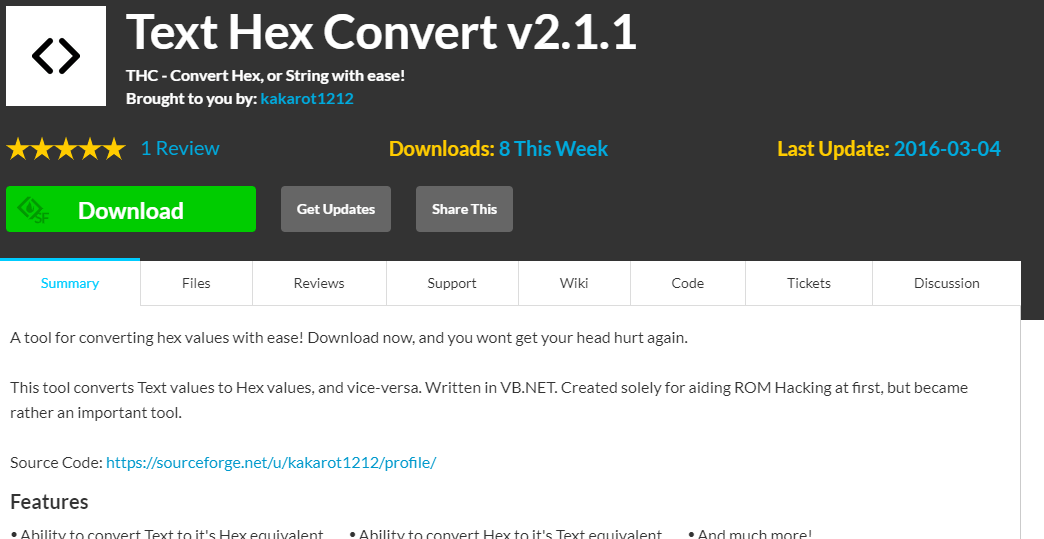21
мар
Online x86 / x64 Assembler and DisassemblerThis tool takes x86 or x64 assembly instructions and converts them to theirbinary representation (machine code). It can also go the other way, takinga hexadecimal string of machine code and transforming it into a human-readablerepresentation of the instructions. It uses GCC and objdump behind the scenes.You can use this tool to learn how x86 instructions are encoded or to help withshellcode development.AssembleEnter your assembly code using Intel syntax below.Architecture:x86x64DisassemblePaste any hex string that encodes x86 instructions (e.g. A shellcode) below.Non-hex characters are skipped over, so you don't have to remove the doublequotes or 'x' if you're disassembling a C-style stringliteral!Architecture:x86x64.
ARM Converter is another light-weight converter tool that can help you transform your ASM files to HEX files. The customization options for your output file is not nearly as complex as in the case of our top choice but does the job fast. One other good thing about ARM Converter is that the impact it has on your system is unnoticeable. Convert text into hexadecimal format. Computers store text as numbers, and with hex you display the numbers not as a decimal number, but in base 16. Hex or base 16 or hexadecimal is a numeral system that uses 16 symbols. The symbols include 0-9 and a-f (sometimes A-F). An example of a hexadecimal number is 3BF2.


This tool takes x86 or x64 assembly instructions and converts them to theirbinary representation (machine code). It can also go the other way, takinga hexadecimal string of machine code and transforming it into a human-readablerepresentation of the instructions. It uses GCC and objdump behind the scenes.
You can use this tool to learn how x86 instructions are encoded or to help withshellcode development.
Assemble
Enter your assembly code using Intel syntax below.
Disassemble
Paste any hex string that encodes x86 instructions (e.g. a shellcode) below.Non-hex characters are skipped over, so you don't have to remove the doublequotes or 'x' if you're disassembling a C-style stringliteral!
Popular Posts
Online x86 / x64 Assembler and DisassemblerThis tool takes x86 or x64 assembly instructions and converts them to theirbinary representation (machine code). It can also go the other way, takinga hexadecimal string of machine code and transforming it into a human-readablerepresentation of the instructions. It uses GCC and objdump behind the scenes.You can use this tool to learn how x86 instructions are encoded or to help withshellcode development.AssembleEnter your assembly code using Intel syntax below.Architecture:x86x64DisassemblePaste any hex string that encodes x86 instructions (e.g. A shellcode) below.Non-hex characters are skipped over, so you don\'t have to remove the doublequotes or \'x' if you\'re disassembling a C-style stringliteral!Architecture:x86x64.
ARM Converter is another light-weight converter tool that can help you transform your ASM files to HEX files. The customization options for your output file is not nearly as complex as in the case of our top choice but does the job fast. One other good thing about ARM Converter is that the impact it has on your system is unnoticeable. Convert text into hexadecimal format. Computers store text as numbers, and with hex you display the numbers not as a decimal number, but in base 16. Hex or base 16 or hexadecimal is a numeral system that uses 16 symbols. The symbols include 0-9 and a-f (sometimes A-F). An example of a hexadecimal number is 3BF2.


This tool takes x86 or x64 assembly instructions and converts them to theirbinary representation (machine code). It can also go the other way, takinga hexadecimal string of machine code and transforming it into a human-readablerepresentation of the instructions. It uses GCC and objdump behind the scenes.
You can use this tool to learn how x86 instructions are encoded or to help withshellcode development.
Assemble
Enter your assembly code using Intel syntax below.
Disassemble
Paste any hex string that encodes x86 instructions (e.g. a shellcode) below.Non-hex characters are skipped over, so you don\'t have to remove the doublequotes or \'x' if you\'re disassembling a C-style stringliteral!
Online x86 / x64 Assembler and DisassemblerThis tool takes x86 or x64 assembly instructions and converts them to theirbinary representation (machine code). It can also go the other way, takinga hexadecimal string of machine code and transforming it into a human-readablerepresentation of the instructions. It uses GCC and objdump behind the scenes.You can use this tool to learn how x86 instructions are encoded or to help withshellcode development.AssembleEnter your assembly code using Intel syntax below.Architecture:x86x64DisassemblePaste any hex string that encodes x86 instructions (e.g. A shellcode) below.Non-hex characters are skipped over, so you don\'t have to remove the doublequotes or \'x' if you\'re disassembling a C-style stringliteral!Architecture:x86x64.
ARM Converter is another light-weight converter tool that can help you transform your ASM files to HEX files. The customization options for your output file is not nearly as complex as in the case of our top choice but does the job fast. One other good thing about ARM Converter is that the impact it has on your system is unnoticeable. Convert text into hexadecimal format. Computers store text as numbers, and with hex you display the numbers not as a decimal number, but in base 16. Hex or base 16 or hexadecimal is a numeral system that uses 16 symbols. The symbols include 0-9 and a-f (sometimes A-F). An example of a hexadecimal number is 3BF2.


This tool takes x86 or x64 assembly instructions and converts them to theirbinary representation (machine code). It can also go the other way, takinga hexadecimal string of machine code and transforming it into a human-readablerepresentation of the instructions. It uses GCC and objdump behind the scenes.
You can use this tool to learn how x86 instructions are encoded or to help withshellcode development.
Assemble
Enter your assembly code using Intel syntax below.
Disassemble
Paste any hex string that encodes x86 instructions (e.g. a shellcode) below.Non-hex characters are skipped over, so you don\'t have to remove the doublequotes or \'x' if you\'re disassembling a C-style stringliteral!



